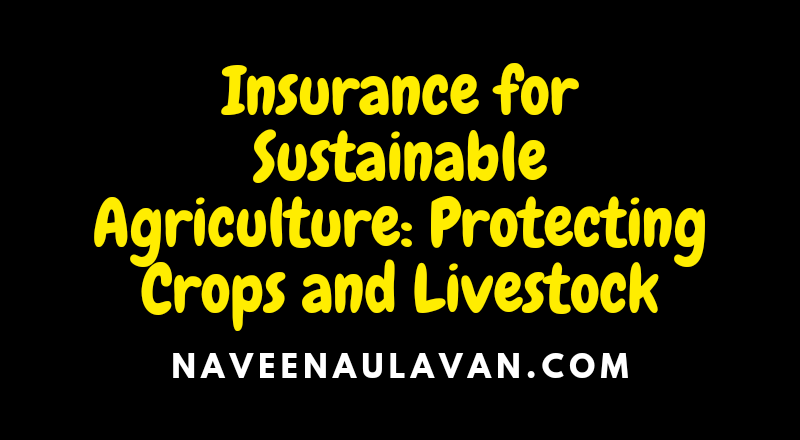Sustainable agriculture is becoming increasingly important as we face the challenges of climate change and a growing global population. Farmers around the world are adopting practices that minimize environmental impact, conserve natural resources, and promote economic viability. However, even with these sustainable practices in place, farmers still face numerous risks that can threaten their crops and livestock. This is where insurance plays a crucial role in protecting the efforts of sustainable farmers and ensuring the stability of the agricultural sector.
- The Need for Insurance in Sustainable Agriculture
- Climate Change and Extreme Weather Events
- Pest and Disease Outbreaks
- Market Volatility and Price Fluctuations
- The Role of Insurance in Sustainable Agriculture
- Crop Insurance
- Livestock Insurance
- Price Risk Management
- The Advantages of Insurance for Sustainable Agriculture
- Financial Security and Stability
- Encouraging Sustainable Practices
- Promoting Long-Term Planning
- Supporting Innovation
The Need for Insurance in Sustainable Agriculture
Sustainable farming practices aim to minimize the use of synthetic inputs, reduce greenhouse gas emissions, and protect biodiversity. These practices often involve a higher level of investment, experimentation, and long-term planning. Given these added complexities, the risks associated with sustainable agriculture can be greater than those faced by conventional farming methods.
1.
Climate Change and Extreme Weather Events
Climate change has led to an increase in extreme weather events such as droughts, floods, hurricanes, and heatwaves, which significantly impact agricultural productivity. Sustainable farmers, who heavily rely on rainwater harvesting, conservation tillage, and organic fertilizers, are affected by these events more severely. Insurance can provide a safety net by compensating farmers for crop or livestock losses caused by such weather-related disasters.
2.
Pest and Disease Outbreaks
Organic and sustainable farming practices often minimize the use of chemical pesticides and rely on natural methods for pest and disease control. However, these practices may be less effective in preventing crop and livestock diseases. Insurance can provide financial protection to farmers in case of disease outbreaks, which can lead to significant losses in terms of reduced yields, increased production costs, and the need for costly treatments.
3.
Market Volatility and Price Fluctuations
Sustainable agriculture often involves niche markets and specialty products, which may be more vulnerable to market volatility and price fluctuations. Farmers may invest in specific crops or livestock breeds that require longer production cycles and have higher input costs. Insurance can help stabilize income by compensating farmers for losses caused by market fluctuations or price drops, thus ensuring the economic viability of sustainable farming practices.
The Role of Insurance in Sustainable Agriculture
Insurance provides a financial safety net for sustainable farmers, allowing them to manage and transfer risk while enabling continued investment in environmentally friendly agriculture. The following types of insurance are particularly relevant and beneficial for sustainable agriculture:
1.
Crop Insurance
Crop insurance is designed to protect farmers against losses caused by natural disasters, diseases, or pests. It provides compensation for crop failures, reduced yields, or damage to crops. Sustainable farmers can benefit from crop insurance by mitigating the financial impact of weather-related events or disease outbreaks that may have a more significant impact on their operations due to reduced reliance on synthetic inputs.
2.
Livestock Insurance
Livestock insurance covers farmers against the death or loss of animals due to accidents, diseases, or theft. Sustainable farmers, often raising rare or heritage breeds, can greatly benefit from livestock insurance. It safeguards their investment in genetic diversity and protects against losses caused by animal diseases that may be more prevalent in sustainable farming systems.
3.
Price Risk Management
Price risk management tools such as futures contracts, options, and revenue insurance are particularly beneficial for sustainable farmers. These tools allow farmers to lock in a minimum price for their products, providing stability and security in volatile markets. By protecting against sudden price drops, sustainable farmers can continue practicing their environmentally friendly methods without compromising their economic viability.
The Advantages of Insurance for Sustainable Agriculture
1.
Financial Security and Stability
Insurance ensures that sustainable farmers have a safety net in place, protecting their investments, income, and livelihoods. By mitigating the financial risks associated with sustainable agriculture, insurance enables farmers to continue implementing environmentally friendly practices without the fear of catastrophic losses.
2.
Encouraging Sustainable Practices
Insurance coverage can incentivize the adoption of sustainable practices by reducing the risks associated with the transition. Farmers are more likely to invest in sustainable farming methods if they have a safety net that safeguards them against potential losses caused by climate-related events or disease outbreaks.
3.
Promoting Long-Term Planning
Insurance facilitates long-term planning for sustainable farmers by providing stability and predictability. It allows farmers to plan for the future, make informed decisions regarding crop selection, livestock management, and investments in sustainable infrastructure.
4.
Supporting Innovation
Insurance promotes innovation in sustainable agriculture by reducing the fear of financial failure associated with experimentation and investment in new technologies and practices. It enables farmers to
